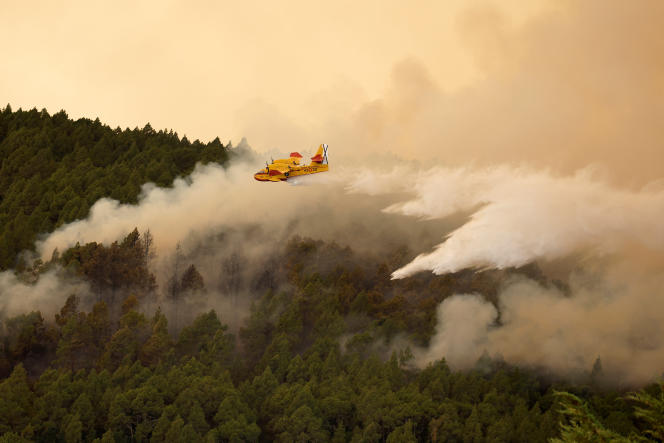The fire that has already ravaged more than 2,600 hectares on the Spanish island of Tenerife is “probably the most complicated” decades on the Canary archipelago, located off the west coast of Africa, said Thursday, August 17 the president of the regional government. The fire, which broke out on Tuesday evening, is raging in a wooded area and ravines in the northeastern part of the island, over a perimeter of more than 30 kilometers, according to the latest report from the authorities.
The government decreed Thursday morning the confinement of the locality of La Esperanza, in the municipality of El Rosario, while a dozen small villages or hamlets in this tourist area were evacuated as a precaution. About 7,600 people in total are affected.
“The night was very hard (…). This fire is probably the most complicated we have had in the Canary Islands (…) at least in the last forty years”said the president of the government of the archipelago, Fernando Clavijo, during a press conference in Tenerife. “Extreme heat and weather circumstances (…) complicate the work of firefighters”he added.
“A fire like we have never seen in the Canary Islands »
More than 250 people, as well as 17 aircraft, are mobilized against the flames. The Military Emergency Unit (UME), which regularly intervenes alongside the firefighters to fight the most voracious fires or the most dangerous for the population, has been mobilized. “A new detachment from the UME is due to arrive in the afternoon”added Mr. Clavijo, which will bring to more than 200 the number of soldiers mobilized on this fire, according to the Ministry of Defense.
“We are facing a fire like we have never seen in the Canary Islands”said meteorologist Vicky Palma during this press conference, referring to a record column of smoke and a continuous diffusion time of the flames of thirty-four hours.
Local authorities have closed the roads leading to the mountains in the northeast of the island. “We ask the population to respect all these roadblocks”, said Wednesday the head of the civil protection department of the archipelago, Montserrat Roman. The blaze comes after a heatwave that swept across the Canary Islands left many areas dry there and increased the risk of wildfires.
According to scientists, extreme weather events have intensified due to global warming. Heat waves are likely to be more frequent and intense and their impact more widespread.
In 2022, 300,000 hectares were destroyed by more than 500 fires in Spain, a record in Europe, according to the European Forest Fire Information System. More than 71,000 hectares have already burned in 2023 in this country, on the front line in the face of global warming.
